Ritalin Free Kids - Drug-Free Alternatives to Stimulants
 "The drugging of children has gotten out of hand that America is waking up to this. This is a national catastrophe.
I'm seeing children who are normal who are on five psychiatric drugs." - Peter R. Breggin, M.D
- International Center for the Study of Psychiatry and Psychology
"The drugging of children has gotten out of hand that America is waking up to this. This is a national catastrophe.
I'm seeing children who are normal who are on five psychiatric drugs." - Peter R. Breggin, M.D
- International Center for the Study of Psychiatry and Psychology
Dr. Robert Mendelsohn MD - "No one has ever been able to
demonstrate that drugs such as Cylert and Ritalin improve the academic performance
of the children who take them.... The pupil is drugged to make life easier for
his teacher, not to make it better and more productive for the child."
Ritalin: Legally Sanctioned "Speed"
Julian Whitaker M.D.
Ritalin (Methylphenidate) is the number one prescription drug for children with attention deficit
hyperactivity disorder (ADHD). This drug has such tremendous potential for abuse
that it is classified as a controlled substance by the Drug Enforcement Agency.
Ritalin is an amphetamine (in street jargon, "speed") with a lengthy list of
side effects, including chronic stress and nervousness, insomnia, nausea, abdominal pain, loss
of appetite, dizziness, palpitations, headaches, irregular heart rhythms, psychic
dependence and in short, addiction.
In fact, Ritalin's appeal to drug users and its potential for abuse are so
high that US House Judiciary Chair Henry Hyde (R-IL) recently filed a request
with the General Accounting Office (GAO) to conduct an investigation of Ritalin
abuse in public schools. In addition, class action lawsuits have been filed
in Texas, California and New Jersey charging Swiss pharmaceutical giant Novartis,
maker of Ritalin, with conspiracy to create the psychiatric disorder known as
ADHD in order to fuel the market for their product.
The psychiatric drug Adderall reportingly caused health complications
Dr. Fred Baughman - "In the area of child psychiatric
drugs, the main focus has been the recently commenced FDA hearings, which pertain
to reports of death, strokes and heart attacks in children and adults. The first
report concerning Adderall came out about a year ago. Adderall is the number
one ADHD drug, and that report dealt with 12 or so individuals that were said
to have had strokes, if you can imagine a stroke occurring in a young child.
Some were sudden deaths and others were heart complications, and a total of
20 to 30 such reports lead Health Canada to take Adderall off the market."
Dr. Baughman was an adult and child neurologist
in private practice for 35 years.
New psychiatric drug with side effects similar to Ritalin
The latest version of methylphenidate
is an extended-released tablet that will be the most expensive prescription
drug on the ADHD market. The once-a-day drug, called Concerta, was launched
with great fanfare just in time for the new school year, with a team of 515
sales reps targeting pediatricians, family practitioners, psychiatrists, neurologists,
and family practitioners around the country. Though promoters of the drug say
it will help eliminate the embarrassment experienced by children who have to
take medication at school, the drug will do nothing to eliminate the dangers
of methylphenidate. In clinical studies, side effects of Concerta were virtually
identical to those of Ritalin.
There are natural alternatives to both Ritalin and Concerta, but you're not
likely to hear about them from most conventional doctors. And if the Federal
Trade Commission (FTC) has its way, you won't be able to find these products
in health food stores, either.

Do Antidepressants Cause Violence and Suicide?
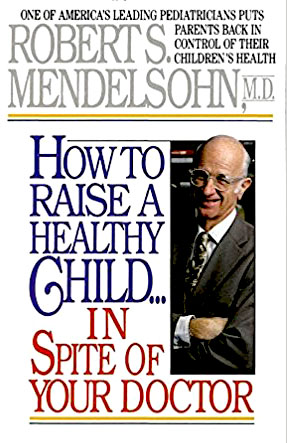 Psychiatric drugs cause major changes in brain chemistry and in behavior.
International drug regulators warn that the drugs we are doling out to kids
can cause mania, psychosis, depersonalization, suicidal and even homicidal ideation.
If we take a look at the school shooters that were under the influence of these
drugs, you have to wonder why there hasn't been a federal investigation
into the correlation between drugs documented to cause violence and suicide
and kids taking them who then became violent and suicidal.
Psychiatric drugs cause major changes in brain chemistry and in behavior.
International drug regulators warn that the drugs we are doling out to kids
can cause mania, psychosis, depersonalization, suicidal and even homicidal ideation.
If we take a look at the school shooters that were under the influence of these
drugs, you have to wonder why there hasn't been a federal investigation
into the correlation between drugs documented to cause violence and suicide
and kids taking them who then became violent and suicidal.
If even a handful of these school shooters were found to be taking PCP or smoking crack we would
have headline news announcing a causal relationship between illicit drug use
and acts of violence. But because these kids are taking legal drugs, prescribed
by a psychiatrist for an alleged mental disorder, something we use to refer
to as "childhood," the powers that be don't think it merits
an investigation.
Well we are all aware of how much Pharma spends on lobbying
efforts. Regarding corporate media I would venture a guess that the reason they
haven't taken on the issue is simple: Big Pharma is now one of, if not
the largest, advertisers in the United States, with $5 billion a year spent
on direct to consumer advertising.
Julian Whitaker, M.D ., believes there is a direct link
between the violent shootings and the increased and indiscriminate
use of popular antidepressant drugs. Dr. Whitaker points out that many
of the gun-related massacres that have made the headlines over the past decade
have a common thread: they were perpetrated by people taking Prozac, Zoloft,
Luvox, Paxil, or a related drug. A documented side effect of these drugs --
known clinically as selective serotonin re-uptake inhibitors (SSRIs) -- is akathisia,
or physical and mental agitation. Dr. Whitaker says "akathisia is to violence what
 a match is to gasoline. And this condition has been reported in a significant
number of Prozac users." Moreover, the Food and Drug Administration has received
over 40,000 reports detailing adverse effects related to Prozac.
a match is to gasoline. And this condition has been reported in a significant
number of Prozac users." Moreover, the Food and Drug Administration has received
over 40,000 reports detailing adverse effects related to Prozac.
Mass Shootings committed
by those under the influence of psychiatric drugs
It comes
as no surprise to anyone who's been following school shootings all the way back
to the Columbine High massacre in Colorado: Every young, male shooter that has
gone on a killing spree in the United States also has a history of treatment
with psychotropic drugs -- typically SSRI antidepressants. These shootings have
three things in common: 1) The shooters are young males. 2) The shooters exhibit
a mind-numbed disconnect with reality. 3) The shooters have a history of taking
psychiatric medications.
Big Pharma Bribes Doctors to Hook Your Kids on Drugs
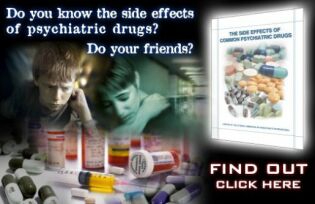 For decades, the majority of American doctors, mental health professionals, the media, and
the general public have yielded to the disseminations of Harvard psychiatrist
Joseph Biedeman who successfully evangelized for more children -- and younger
children -- to be medicated with powerful psychiatric drugs. The blow-back from
ADHD drugs is reported in the current July 2009 Scientific American Mind article
"Do ADHD Drugs Take a Toll on the Brain?" a comprehensive report of the long-term
dangers of ADHD drugs such as Ritalin, Concerta, Adderall, and Vyvanse. The
Centers for Disease Control (CDC) estimated in 2005 that 9% of boys and 4% of
girls in the U.S. were taking ADHD stimulant medications; and according to a
2007 study, ADHD-drug prescriptions rose by almost 12 percent a year between
2000 and 2005.
For decades, the majority of American doctors, mental health professionals, the media, and
the general public have yielded to the disseminations of Harvard psychiatrist
Joseph Biedeman who successfully evangelized for more children -- and younger
children -- to be medicated with powerful psychiatric drugs. The blow-back from
ADHD drugs is reported in the current July 2009 Scientific American Mind article
"Do ADHD Drugs Take a Toll on the Brain?" a comprehensive report of the long-term
dangers of ADHD drugs such as Ritalin, Concerta, Adderall, and Vyvanse. The
Centers for Disease Control (CDC) estimated in 2005 that 9% of boys and 4% of
girls in the U.S. were taking ADHD stimulant medications; and according to a
2007 study, ADHD-drug prescriptions rose by almost 12 percent a year between
2000 and 2005.
ADHD drugs are either the "amphetamine-like" methylphenidate (e.g., Ritalin
and Concerta) or actual amphetamines (e.g., Adderall and Vyvanse), so it should
not be surprising that long-term use is associated with many hazards. The current
Scientific American Mind piece, authored by Edmund S. Higgins, clinical associate
professor of family medicine and psychiatry at the Medical University of South
Carolina states, "Methylphenidate has a chemical structure similar to that of
cocaine and acts on the brain in a very similar way." In February 2009, neuroscientists
at the Rockefeller University reported cocaine-like structural and chemical
alterations in the brains of mice given methylphenidate.

Glutathione and ADHD Children
The effect of low Glutathione levels in children suffering from attention
deficit hyperactivity disorder (ADHD).
Redox Rep. 2006;11(4):163-72. Department of Medical Chemistry, Biochemistry
and Clinical Biochemistry, Faculty of Medicine, Comenius University, Bratislava,
Slovak Republic. Attention deficit hyperactivity disorder (ADHD) belongs to
the neuro-
 developmental disorders characterized by
impulsivity, distractibility
and hyperactivity. In the pathogenesis of ADHD genetic and non-genetic factors
play an important role. It is assumed that one of non-genetic factors could
be oxidative stress. This randomized, double-blind, placebo-controlled study
investigated the influence of inter-cellular reduced Glutathione and oxidized
Glutathione in children suffering from ADHD and total antioxidant status (TAS).
This is the first investigation of the redox Glutathione state in relation to
ADHD.
developmental disorders characterized by
impulsivity, distractibility
and hyperactivity. In the pathogenesis of ADHD genetic and non-genetic factors
play an important role. It is assumed that one of non-genetic factors could
be oxidative stress. This randomized, double-blind, placebo-controlled study
investigated the influence of inter-cellular reduced Glutathione and oxidized
Glutathione in children suffering from ADHD and total antioxidant status (TAS).
This is the first investigation of the redox Glutathione state in relation to
ADHD.
RESULTS: One month of Glutathione administration caused a significant decrease
in oxidized Glutathione and a highly significant increase in Glutathione levels
as well as improvement of Glutathione/oxidized Glutathione ratio in comparison
to a group of patients taking a placebo. TAS in children with ADHD was decreased
in comparison with reference values. Glutathione administration normalized the
TAS of ADHD children in this study.
Glutathione is a master antioxidant, an important line of
defense against diseases, toxins, viruses, pollutants,
radiation and oxidative stress. Low glutathione levels are linked to diseases
such as Cancer, Multiple Sclerosis, AIDS, Alzheimer's, Parkinson's,
Atherosclerosis, pregnancy complications, male and female infertility and Cataracts. A
Glutathione deficiency can cause a lack of coordination, mental disorders, tremors,
and difficulty maintaining balance. Glutathione is continuously defending our
body against attacks from disease, toxins, poisons, viruses, pollutants, radiation
and oxidative stress. Without Glutathione our liver would soon become overwhelmed
with the accumulation of toxins, resulting in organ failure and death.

 TeenScreen, A Front Group for the Psycho-Pharmaceutical
Industrial Complex is a very controversial so-called "diagnostic psychiatric
service" aka suicide survey; done on children who are then referred to psychiatric
treatment. The evidence suggests that the objective of the psychiatrists who
designed TeenScreen is to place children so selected on psychotropic drugs.
"It's just a way to put more people on prescription drugs," said Marcia Angell,
a medical ethics lecturer at Harvard Medical School and author of "The Truth
About Drug Companies." She said such programs will boost the sale of antidepressants
even after the FDA in September ordered a "black box" label warning that the
pills might spur suicidal thoughts or actions in minors. (The New York Post,
December 5, 2004)
TeenScreen, A Front Group for the Psycho-Pharmaceutical
Industrial Complex is a very controversial so-called "diagnostic psychiatric
service" aka suicide survey; done on children who are then referred to psychiatric
treatment. The evidence suggests that the objective of the psychiatrists who
designed TeenScreen is to place children so selected on psychotropic drugs.
"It's just a way to put more people on prescription drugs," said Marcia Angell,
a medical ethics lecturer at Harvard Medical School and author of "The Truth
About Drug Companies." She said such programs will boost the sale of antidepressants
even after the FDA in September ordered a "black box" label warning that the
pills might spur suicidal thoughts or actions in minors. (The New York Post,
December 5, 2004)
The American Heart Association Alert for ADD/ADHD Children
The American Heart Association issued a recommendation for all children currently taking
or diagnosed to begin taking prescription ADD/ADHD medication to receive a thorough
cardiovascular screening. This warning follows last year's FDA ordinance to
ADD/ADHD drug manufacturers to include warning labels on drugs regarding the
increased risk for cardiac complications among those with underlying heart conditions,
as prescription ADD/ADHD stimulants raise both heart rate and blood pressure.

Study Indicates Nutritional Deficiencies Lead to Aggression and Violence in Children
A new study published in the American Journal of Psychiatry shows that children
who experience malnutrition exhibit strikingly increased behavioral
disorders and aggressive behavior as they grow older. Children who suffered
certain nutritional deficiencies demonstrated a shocking 41% increase in aggression
at age eight. At age 17, they demonstrated a 51% increase in violent and antisocial
behaviors.
And the only difference is their diet.
The Connection Between ADD and Diet
It has long been known that consumption of certain foods and beverages can
have a noticeable and particularly bad effect on ADD children, causing severe
problems. These children, for example, often become extremely hyperactive after
having colored cordials or fruit syrup drinks, hot dogs, various junk foods
and cola drinks. Hertha Hafer has been studying the dietary connection to ADD/ADHD
for twenty and more years. While it has long been known that some foods can
make symptoms worse, why was not known. Hafer's genius lies in her close analytical
investigation of the ingredients of the foods we consume, which led her to the
discovery that there is a common component in the foods which affect ADD children.
That component is phosphate. This major discovery
led Hertha to write down her findings and publish them in her book: "The Hidden
Drug - Dietary Phosphate"
Excerpt from Dr. Rapp's letter
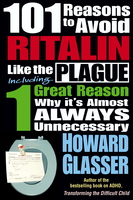 "A local Phoenix station interviewed a mother with an extremely aggressive
son and found the answer in the refrigerator. Red dyes, as Dr. Feingold stated
in the '70's and I said in the 80's, triggered this boy's reaction.
There are hundreds of thousands of parents who have seen their children become
wild and uncontrollable from a highly colored beverage or cereal."
"A local Phoenix station interviewed a mother with an extremely aggressive
son and found the answer in the refrigerator. Red dyes, as Dr. Feingold stated
in the '70's and I said in the 80's, triggered this boy's reaction.
There are hundreds of thousands of parents who have seen their children become
wild and uncontrollable from a highly colored beverage or cereal."
Lendon Smith, M.D. - "Most of the children I treated with
diet and supplements no longer needed the Ritalin they had been taking. Their
problem was NOT a Ritalin deficiency. They had mineral and vitamin deficiencies. Their behavior good mornings and
terrible afternoons; either sleepy or restless and inattentive were easily explained
by their diet. Along with a better diet, they needed minerals to act as co-enzymes
for basic metabolism. As I expanded my research with reading and using nutrition
as treatment for patients, I noted that the nutritional approach was valid for
other conditions not just the hyperactive child."
John Taylor, Ph.D., Licenced Psychologist and leading AD/HD authority
The "Children and Algae Report" is a summary of the information
of the Center for Family Wellness gathered during their research study of 140
children. This study was designed to investigate the effects of feeding Super
Blue Green Algae to children who struggle with learning, social and behavioral problems.
The Algae AD/HD Connection - Can
Blue Green Algae Be of Help with Attention Deficit/Hyperactivity Disorder?

A.D.D. and A.D.H.D. Diet
Rachel Bell and Dr. Howard Peiper
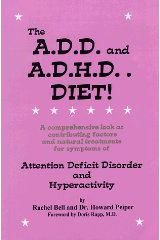 In the Preface the authors present a constellation
of behavioral, cognitive, social, and muscular symptoms attributed to A.D.D./A.D.H.D.
In the Foreword, Dr. Doris Rapp estimates that 8 to 22 million children will
have been placed on activity-modifying drugs like Ritalin by 2000, yet 20 to
40% will not be helped by these drugs. She believes that many drugs should be
the last choice in treating A.D.D./A.D.H.D., especially when they have a long
list of side effects. The first choice should be to detect and eliminate "the
cause" of the illness among multiple causes from favorite foods, diet, additives,
metals, toxins, dust, mold, pollen, chemicals, noise, sources of electromagnetic
(and other forms of) energy, misalignments of the skull, vertebra of the spine,
and so on. The authors' strongly assert that you can do something about these
conditions, if willing to open your mind, search, and find out what works best
for you or a specific child.
In the Preface the authors present a constellation
of behavioral, cognitive, social, and muscular symptoms attributed to A.D.D./A.D.H.D.
In the Foreword, Dr. Doris Rapp estimates that 8 to 22 million children will
have been placed on activity-modifying drugs like Ritalin by 2000, yet 20 to
40% will not be helped by these drugs. She believes that many drugs should be
the last choice in treating A.D.D./A.D.H.D., especially when they have a long
list of side effects. The first choice should be to detect and eliminate "the
cause" of the illness among multiple causes from favorite foods, diet, additives,
metals, toxins, dust, mold, pollen, chemicals, noise, sources of electromagnetic
(and other forms of) energy, misalignments of the skull, vertebra of the spine,
and so on. The authors' strongly assert that you can do something about these
conditions, if willing to open your mind, search, and find out what works best
for you or a specific child.
It has long been known that consumption of certain foods and beverages can
have a noticeable and particularly bad effect on ADD children, causing severe
problems. These children, for example, often become extremely hyperactive after
having colored cordials or fruit syrup drinks, hot dogs, various junk foods
and cola drinks.
"My son, who is 8 years old has been diagnosed since birth with epilepsy,
autism, ADHD, tourettes, and more. He was using 5 different medications a day
and it was a struggle to get him to function. People were scared of him. He
would never get invited to birthday parties or sleepovers. He had a very aggressive
nature, he could only sleep 2 hours at a time, he was wetting the bed and was
15 pounds underweight. After 6 weeks of taking Phytoplankton micronutrients he
is now medication free, which is amazing! He has been in a special needs school
since he was 3 years old. His teacher cannot believe the difference in his behavior
in such a short amount of time. The boy that always struggled, just received
3 A's, 2 B's and 1 C on his final report card. He is now sleeping through the
night, no longer wets the bed and his weight is now up to normal.
Everybody is noticing the dramatic change and is asking what has happened.
Balancing Children's Nutrition with Marine Phytoplankton
All we can say is Marine Phytoplankton and hand them a brochure.
I had tears in my eyes when he got invited to a birthday party and his first
sleepover recently. Life cannot be better when you see your children live happy
and peaceful lives. Words cannot express the gratitude I have. Thank you
Marine Phytoplankton for giving us peace and well-being. Before Marine Phytoplankton
the cost of the medications for the 3 of us was $800 per month!" R. R.
Magnesium Deficiency and Attention deficit/hyperactivity disorder (ADHD)
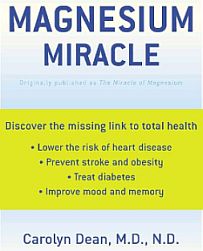 Magnesium is nothing short of a miracle mineral in its healing effect on
a wide range of diseases as well as in its ability to rejuvenate the aging body.
Symptoms of magnesium deficiency may include agitation and anxiety, restless
leg syndrome (RLS), sleep disorders, irritability, nausea and vomiting, abnormal
heart rhythms, low blood pressure, confusion, muscle spasm and weakness, hyperventilation,
insomnia, and even seizures. Approximately nine out of ten people will show
dramatic improvements in the state of their health when they replete their magnesium
levels and the very best way to do that is with ancient minerals magnesium drawn
from an ancient inactive seabed 2 miles beneath the earth in Europe. With such "brine
solutions" one can simply apply the concentrate to the skin or pour it
into ones bath water and one will have a medical treatment of primordial priority.
Nothing short of a miracle is to be expected in ones health status if one is
ill when one increases the cellular levels of magnesium.
Magnesium is nothing short of a miracle mineral in its healing effect on
a wide range of diseases as well as in its ability to rejuvenate the aging body.
Symptoms of magnesium deficiency may include agitation and anxiety, restless
leg syndrome (RLS), sleep disorders, irritability, nausea and vomiting, abnormal
heart rhythms, low blood pressure, confusion, muscle spasm and weakness, hyperventilation,
insomnia, and even seizures. Approximately nine out of ten people will show
dramatic improvements in the state of their health when they replete their magnesium
levels and the very best way to do that is with ancient minerals magnesium drawn
from an ancient inactive seabed 2 miles beneath the earth in Europe. With such "brine
solutions" one can simply apply the concentrate to the skin or pour it
into ones bath water and one will have a medical treatment of primordial priority.
Nothing short of a miracle is to be expected in ones health status if one is
ill when one increases the cellular levels of magnesium.

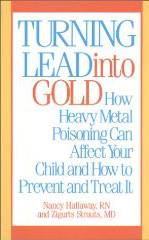 According to the American Academy of Pediatrics between
4 to 12 % of all school age children are affected by
ADHD and a similar number have some degree of dyslexia.
According to the American Academy of Pediatrics between
4 to 12 % of all school age children are affected by
ADHD and a similar number have some degree of dyslexia.
Nancy Hallaway, RN, and author of the book 'Turning
Lead into Gold' - How Heavy Metal Poisoning Can Affect Your Child and How to
Prevent and Treat It, found this out the hard way. Her twin boys were diagnosed
as hyperactive with Attention Deficit Disorder and
severe autistic tendencies . Her doctor found unacceptable
levels of toxic metals such as
lead, arsenic, aluminum and cadmium in their bodies, and his treatments led
to immediate and spectacular improvement in both children.
These children were prescribed Ritalin, then Anafril, and then Clonidine
at age three. Since their first treatment to remove the heavy metals, they have
not needed any medications at all for their previously diagnosed disorders.
According to Nancy Hallaway, their eye contact is great, their unusual agitation
and anxieties have disappeared, and though Nancy was told that the twins might
never talk, not only are they both talking now, but they attend regular classes
in school. All this resulted from removing toxic metals from their body tissues.
Whether the link to heavy metals, chemicals and vaccination
toxins is causal or not, there is no question among many doctors, scientists
and parents alike that children have regressed developmentally and/or shown
signs of autistic spectrum disorders and ADD upon receiving the basic childhood
vaccinations, such as MMR and DPT.
In addition, mercury and other heavy metals can accumulate in the body of
the fetus, as these metals can and do cross over from the mother into the unborn
baby via the placenta. Particularly implicated are iron, lead, mercury and copper.
This may explain why some children who were not immunized nevertheless have
autism or show autistic tendencies.
The fact that heavy metals can and do build up in the body of unborn children
echoes the findings of doctors Walsh and Usman: If these children are missing
an enzyme to break down heavy metals, these metals that cross over from the
placenta will accumulate in the tissues of the body and cause damage to the
brain and immune system, even in unborn children.
Ritalin may cause genetic damage, cancer
A new study found that every one of a dozen children
treated for attention deficit/ hyperactivity disorder with methylphenidate experienced
a threefold increase in levels of chromosome abnormalities—occurrences
associated with increased risks of cancer and other adverse health effects.
Methylphenidate is the most widely prescribed of a class of amphetamine-like
drugs used to treat ADHD, with more than 10 million prescriptions written for
it in 1996 alone. Between 1991 and 1999, United States sales of methylphenidate
increased more than 500 percent.
Omega-3 Deficiencies
A Purdue University study showed that kids low in
Omega-3 essential fatty acids are significantly more likely to be hyperactive, have learning
disorders, and to display behavioral problems. Omega-3 deficiencies have also
been tied to dyslexia, violence, depression, memory problems, weight gain, cancer,
heart disease, eczema, allergies, inflammatory diseases, arthritis, diabetes,
and many other conditions.
Over 2,000 scientific studies have demonstrated the wide range of problems
associated with Omega-3 deficiencies. The American diet is almost devoid of Omega 3's except for certain types of
fish. In fact, researchers believe that about 60% of Americans are
in deficient omega-3 fatty acids , and about
20% have so little that test methods cannot even detect any in their blood.
Your brain is more than 60% structural fat, just as your muscles are made of
protein and your bones are made of calcium. But it's not just any fat that our
brains are made of. It has to be certain types of fats, and we no longer eat
these types of fats like we used to. Worse, we eat man-made trans-fats and excessive
amounts of saturated fats and vegetable oils high in Omega-6 fatty acids, all
of which interfere which our body's attempt to utilize the tiny amount of Omega-3
fats that it gets. Other parts of our bodies also need Omega-3 fatty acids.
Symptoms of fatty acid deficiency include a variety of
skin problems such as eczema,
thick patches of skin, and cracked heels. Omega 3 fatty acids are known
to improve mental function, mood, memory and concentration and have already
demonstrated considerable success in the treatment of conditions such as depression,
anxiety, bipolar disorder, schizophrenia, ADD and ADHD.
Hyperactive children lack essential fatty acids
Children suffering from attention-deficit hyperactivity disorder (ADHD) are inattentive,
impulsive, and hyperactive. Researchers at Purdue University now report that
hyperactive children have lower levels of key essential fatty acids in their blood than
do normal children. Their experiment involved 53 boys aged 6 to 12 years of
age who suffered from ADHD, but were otherwise healthy and 43 matched controls.
Analyses showed that the boys with ADHD had significantly lower levels of arachidonic,
eicosapentaenoic, and docosahexaenoic acids in their blood. The hyperactive
children suffered more from symptoms associated with essential fatty acid deficiency
(thirst, frequent urination, and dry hair and skin) and were also much more
likely to have asthma and to have had many ear infections. The researchers conclude
that ADHD may be linked to a low intake of omega-3 fatty acids (linolenic, eicosapentaenoic,
and docosahexaenoic acids) or a poorer ability to convert 18-carbon fatty acids
to longer more highly unsaturated acids. The researchers conclude that supplementation
with the missing fatty acids may be a useful treatment for hyperactivity.
Stevens, Laura J., et al. Essential fatty acid
metabolism in boys with attention-deficit hyperactivity disorder. American Journal
of Clinical Nutrition, Vol. 62, No. 4, October 1995, pp. 761-68

The Importance of Proper Nutrition for Children
We live in a society where $33 billion dollars per year is pumped into
advertising unhealthy processed foods, fast foods and junk foods - and a large
percentage of that advertising is aimed right at your kids, and it works.
The processed food industry has successfully changed what we consider to be "normal"
in terms what we eat and what we feed our children. The processed food, junk
food, and fast food industries are serving it up, Americans are gulping it down,
and wide spread obesity and chronic disease is the result. From there, the masses
are driven into the "waiting hands" of the highly profitable drug companies.
We're offered pills that alleviate our symptoms while the simple underlying
causes are ignored. Every dollar that the drug companies spend on TV drug ads
result in over $4 in drug sales and there's no end in sight.
Magnesium deficiency and ADHD
"Some experts believe that children with ADHD may be exhibiting the effects
of mild magnesium deficiency (such as irritability, decreased attention span,
and mental confusion). In one study of 116 children with ADHD, 95% were magnesium
deficient. In a separate study, 75
magnesium-deficient children with ADHD were randomly assigned to receive
magnesium supplements in addition to standard treatment or standard treatment
alone for 6 months. Those who received magnesium demonstrated a significant
improvement in behavior, whereas those who received only standard therapy without
magnesium exhibited worsening behavior. These results suggest that magnesium
supplementation, or at least high amounts of magnesium in the diet, may prove
to be beneficial for children with ADHD. Speak with your physician about possible use."
Homeopathy as a Highly Effective Treatment for ADD
 Homeopaths are able to treat ADD effectively in many cases by bringing the
individual into balance. Homeopaths treat people with ADD, not the ADD itself.
For a homeopath, what needs to be treated is the specific pattern of symptoms
which an individual presents. Only the one homeopathic medicine that specifically
matches the unique symptoms of the individual will allow the person to live
in a functional way.
Homeopaths are able to treat ADD effectively in many cases by bringing the
individual into balance. Homeopaths treat people with ADD, not the ADD itself.
For a homeopath, what needs to be treated is the specific pattern of symptoms
which an individual presents. Only the one homeopathic medicine that specifically
matches the unique symptoms of the individual will allow the person to live
in a functional way.
Homeopathy is safe and effective natural medicine with a high success rate in treating
emotional and behavioral disorders in children and teens - including attention
deficit, hyperactivity, depression, apathy, anxiety, anger, aggression, defiance,
and obsessive-compulsive disorders. Rather than suppressing symptoms, homeopathy
seeks to create deep, long-term behavioral changes. Quoting from Edward H. Chapman,
M.D., Dht, President of the American Institute of Homeopathy, and Clinical Instructor
at the Harvard University School of Medicine: "For those who need support in
their struggle with Attention Deficit Hyperactivity Disorder … they can
be assured from two hundred years experience using homeopathic medicines that
they are safe. Your conventional doctor may be skeptical if you choose to use
homeopathy. Don't let that stop you. Seek assistance from well-trained homeopathic
providers who are willing to work with you and your doctors."

Ritalin: Wonder Drug or Marketing Fraud?
Lawsuits filed in Texas, California and New Jersey
claim that the booming success of Ritalin is the result of a conspiracy in which
the American Psychiatric Association, Novartis Pharmaceutical Corp. and national
parents' group Children and Adults With Attention-Deficit/Hyperactivity Disorder
(CHADD) colluded to create the diagnoses of Attention Deficit Disorder (ADD)
and Attention Deficit Hyperactivity Disorder (ADHD). Following the acceptance
of ADD/ADHD as medical diagnoses, sales of Ritalin and similar stimulants have
skyrocketed, with more than 6 million such prescriptions being written in 1995,
according to the National Institute of Mental Health.
The Last Normal Child: Essays on the Intersection of Kids, Culture, and Psychiatric Drugs
Lawrence H. Diller MD
 This book is obligatory reading for anyone who wants to make sense out of the present confusion about medicating children
to improve their behavior. Dr. Diller is a rare voice of moderation in this
disputed area. He agrees that a few children are greatly improved in the short
term by such medications, but he decries the excessive labeling, the unreasonable
pressures from schools and parents, the aggressive advertising by the drug companies
to parents and physicians, and the neglect of the essential psychosocial management
of these children with such traditional techniques as effective discipline."
- William B. Carey, M.D. Division of General Pediatrics The Children's Hospital
of Philadelphia Clinical Professor of Pediatrics, University of Pennsylvania,
School of Medicine Author of Understanding Your Child's Temperament and Coping
with Children's Temperament
This book is obligatory reading for anyone who wants to make sense out of the present confusion about medicating children
to improve their behavior. Dr. Diller is a rare voice of moderation in this
disputed area. He agrees that a few children are greatly improved in the short
term by such medications, but he decries the excessive labeling, the unreasonable
pressures from schools and parents, the aggressive advertising by the drug companies
to parents and physicians, and the neglect of the essential psychosocial management
of these children with such traditional techniques as effective discipline."
- William B. Carey, M.D. Division of General Pediatrics The Children's Hospital
of Philadelphia Clinical Professor of Pediatrics, University of Pennsylvania,
School of Medicine Author of Understanding Your Child's Temperament and Coping
with Children's Temperament
"We are all caught in the whether-to
or whether-not to medicate children who are on the ADHD spectrum. Some children
profit from medication, and most don't deserve it. This book may help you sort
out when and whether. I liked the stories and the approach to medication that
they convey. It is a convincing book." - T. Berry Brazelton, M.D. Founder, Child
Development Unit, Children's Hospital Boston Professor of Pediatrics and Human
Development, Brown University Clinical Professor of Pediatrics Emeritus, Harvard
Medical School Author, 28 books including Touchpoints and the classic trilogy
Infants and Mothers, Toddlers and Parents, and On Becoming a Family.
The Hazards of Treating "Attention-Deficit/Hyperactivity Disorder" with Methylphenidate (Ritalin)
by Peter R. Breggin, M.D.
The criteria for Attention-Deficit/Hyperactivity Disorder focus
on behaviors that adults find frustrating and disruptive. Conflicts between
children and adults are redefined as diseases or disorders within the children.
Treatment with stimulant drugs such as methylphenidate (Ritalin) will produce
greater docility in any child (or animal) without actually improving conduct
or academic performance. Parents are not informed that they are trading behavioral
control for toxic drug effects. The label ADHD is attached to children who are
in reality deprived of appropriate adult attention These children require improved
adult attention to their basic needs.